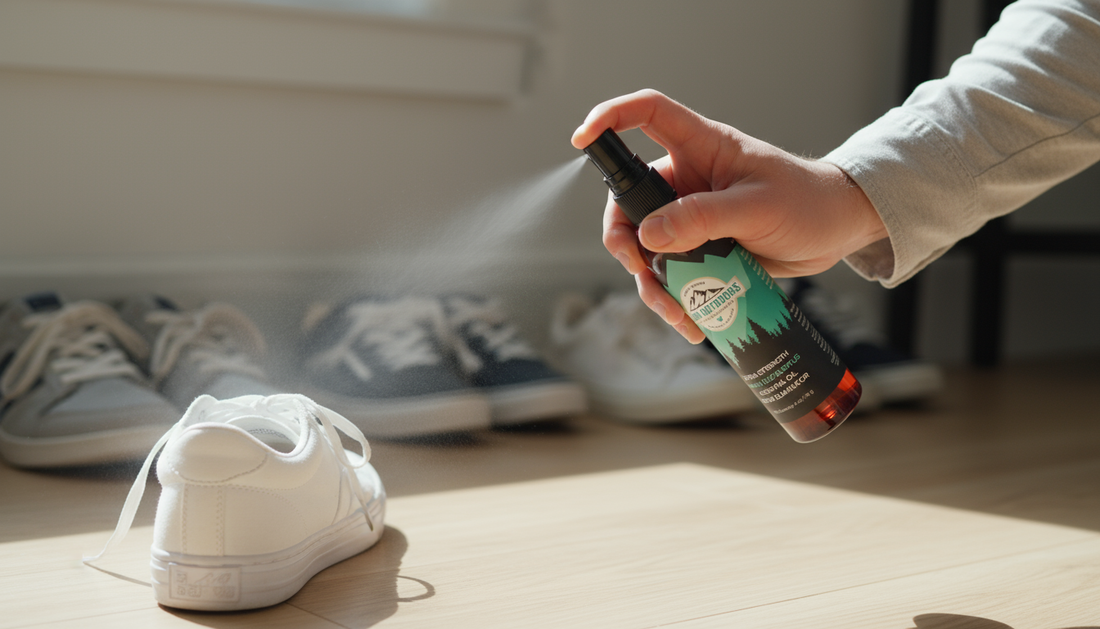
Isopropyl Alcohol for Smelly Shoes: Does it Work?
Share
Tackling Stubborn Shoe Odor: Which Solutions Actually Work?
Key Takeaways
- While isopropyl alcohol can temporarily neutralize some shoe odor, it's not a long-term solution and carries risks to shoe materials.
- For effective and lasting shoe odor elimination, look for dedicated natural shoe deodorizers with enzymes or essential oils.
- Preventative measures like proper shoe rotation, drying, and using a daily shoe spray are crucial for keeping footwear fresh.
Ah, the dreaded smelly shoe! We've all been there, haven't we? You kick off your shoes after a long day, and suddenly the whole room is assaulted by a less-than-pleasant aroma. It's embarrassing, it's uncomfortable, and it's a problem most of us want to solve quickly and effectively. In our quest for fresh footwear, endless hacks and home remedies pop up, and one that often circulates is using isopropyl alcohol for smelly shoes. But does this common household item really live up to the hype? Let's dive in and see if this popular hack actually works, what its limitations are, and what truly effective solutions look like.
When it comes to shoe odor, we're essentially dealing with the presence of microorganisms that thrive in dark, damp environments like the inside of your shoes, especially after a workout or a long day on your feet. These little guys break down sweat and skin cells, releasing those characteristic foul-smelling compounds. So, any good solution needs to address this root cause, not just mask the smell. Isopropyl alcohol seems like it might fit the bill, but as we'll discover, it's not always the best tool for the job.
The Isopropyl Alcohol Approach: A Closer Look
What It Is
Isopropyl alcohol, also known as rubbing alcohol, is a common solvent and disinfectant. It's readily available in most pharmacies and grocery stores, usually in concentrations of 70% or 91%. Its properties include rapid evaporation and the ability to dissolve many organic compounds, which is why it's often suggested for cleaning and disinfecting surfaces. The idea behind using it for shoes is that its drying and disinfecting properties might help eliminate the odor-causing culprits.

What It Means For You
- ✅ Temporary Odor Reduction: It can indeed kill some of the odor-causing things in your shoes, offering a temporary reprieve from the smell.
- ✅ Quick Drying: Since it evaporates quickly, it won't leave your shoes feeling damp.
- ❌ Material Damage: Repeated use can dry out and damage certain shoe materials like leather, suede, or specific synthetic fabrics, leading to cracking or discoloration over time.
- ❌ Flammability Risk: It's highly flammable, requiring careful use and storage, especially around heat sources.
- ❌ Not a Long-Term Solution: It doesn't address the underlying conditions that lead to odor (sweat, trapped moisture) as effectively as dedicated shoe deodorizers.
Feature: Drying & Disinfecting Power
What It Is
Isopropyl alcohol acts as a quick-drying solvent and a surface disinfectant. When sprayed into shoes, it can dehydrate and disrupt the cellular structure of some microorganisms. The rapid evaporation helps to dry out any residual moisture, which is another factor contributing to shoe odor.

What It Means For You
- ✅ Instant Dryness: Helps remove moisture that things thrive in.
- ✅ Surface Cleaning: Can clean some surface gunk that contributes to smell.
- ❌ Superficial Action: It generally only affects the surface, not deeply penetrating materials where odors can linger.
- ❌ Potential for Recurrence: Odor-causing elements often return quickly because the alcohol doesn't change the shoe's environment to prevent their regrowth.
Thinking about tackling those tough smells? Some shoes need extra help! For an in-depth guide on the really stubborn cases, check out our article: Ultimate Guide: How to Get Rid of Smell from Work Boots.
Feature: Accessibility & Cost
Shoe Odor Solutions Comparison
| Feature/Benefit | Isopropyl Alcohol | Natural Shoe Deodorizer (e.g., Lumi Outdoors Spray) |
|---|---|---|
| Odor Elimination Mechanism | Surface disinfection & quick drying; may temporarily mask. | Neutralizes odors at a molecular level, often using plant-based enzymes or essential oils. |
| Effectiveness | Temporary. Requires frequent reapplication. | Long-lasting and preventative by breaking down odor molecules. |
| Safety for Shoe Materials | Risk of drying, cracking, and discoloration, especially on leather, suede, and some synthetics. | Safe for all shoe materials, including delicate ones. |
| Ingredient Safety | Flammable, potential for skin/respiratory irritation. | Plant-based, non-toxic, and family-safe. |
| Effort/Convenience | Requires careful application and ventilation. | Easy spray-and-go application, often works overnight. |
| Scent Profile | Strong chemical smell. | Pleasant, natural scents from essential oils. |
What It Is
Isopropyl alcohol is inexpensive and widely available, making it an easy item to pick up almost anywhere.
What It Means For You
- ✅ Budget-Friendly: It's a very cheap option if you're looking for a quick fix.
- ✅ Easy to Find: No special trips needed; it's likely already in your home.
- ❌ False Economy: While cheap upfront, potential damage to shoes or the need for frequent reapplication might make it more costly in the long run compared to a dedicated product.
My shoes smelled STANK and it seriously made the smell go away. I even made my roommate take a whiff and she was shocked. I sprayed into the shoe 3 times and overnight it really made an enormous difference. I wear them without socks too so feet were totally fine no negative skin reaction or anything!
Feature: Safety Concerns
What It Is
As a chemical, isopropyl alcohol comes with specific handling and usage instructions to ensure safety. These include keeping it away from open flames and ensuring good ventilation.
What It Means For You
- ❌ Flammability Risk: You must be careful to use it in well-ventilated areas and away from any ignition sources.
- ❌ Skin Irritation: Direct or prolonged skin contact can cause dryness or irritation for some individuals.
- ❌ Inhalation Concerns: Breathing in large amounts of fumes isn't recommended.
The Clear Choice: Dedicated Shoe Deodorizers vs. DIY Hacks
When it comes to truly eliminating shoe odor and keeping your footwear fresh, how do isopropyl alcohol and other DIY methods stack up against purpose-built solutions?

| Feature/Benefit | Isopropyl Alcohol | Natural Shoe Deodorizer (e.g., Lumi Outdoors Spray) |
|---|---|---|
| Odor Elimination Mechanism | Surface disinfection & quick drying; may temporarily mask. | Neutralizes odors at a molecular level, often using plant-based enzymes or essential oils. |
| Effectiveness | Temporary. Requires frequent reapplication. | Long-lasting and preventative by breaking down odor molecules. |
| Safety for Shoe Materials | Risk of drying, cracking, and discoloration, especially on leather, suede, and some synthetics. | Safe for all shoe materials, including delicate ones. |
| Ingredient Safety | Flammable, potential for skin/respiratory irritation. | Plant-based, non-toxic, and family-safe. |
| Effort/Convenience | Requires careful application and ventilation. | Easy spray-and-go application, often works overnight. |
| Scent Profile | Strong chemical smell. | Pleasant, natural scents from essential oils. |
While isopropyl alcohol offers a quick, cheap fix, it's often a case of false economy. For truly effective, long-lasting odor elimination that's safe for your shoes and family, a dedicated natural shoe deodorizer is the smarter investment. It tackles the root cause of the odor without the risks or damage.
For those really tough, lingering smells, especially from active footwear, you need something robust. Our Natural Extra Strength Lemon Eucalyptus Shoe Deodorizer Spray is designed to tackle even the most potent shoe odors, eradicating them permanently. It's perfect for work boots, sports cleats, and any shoe that's seen its fair share of intense activity.
This product WORKS. My son's sneakers used to stink up our whole mudroom. We were using chemical sprays which only masked the problem but the underlying odor was still there. I wanted a chemical free approach to dealing with the odor and found this product. It eliminates odor and has a very pleasant and natural smell. Problem solved!
What about daily freshness? For everyday shoes that need a gentle refresh, consider our Natural Citrus Tea Tree Shoe Deodorizer Spray. It's a wonderful solution for preventing odor buildup and keeping your sneakers, flats, and everyday shoes smelling clean and bright.
Frequently Asked Questions
Can I use isopropyl alcohol to clean the outside of my shoes?
While you might be tempted, it's generally not recommended. Isopropyl alcohol can be too harsh for many shoe materials, potentially leading to discoloration, dryness, or damage, especially on leather, suede, or dyed fabrics. For cleaning the outside of shoes, it's always best to follow the manufacturer's care instructions or use products specifically designed for your shoe's material.
How often would I need to use isopropyl alcohol for shoe odor?
Because isopropyl alcohol doesn't provide a long-term solution by changing the shoe's environment, you'd likely need to use it frequently, perhaps even daily, to keep odors at bay. This constant application increases the risk of damaging your shoes over time and the exposure to its fumes. Compare this to a dedicated shoe deodorizer that creates a lasting fresh environment.
Are there any natural alternatives to isopropyl alcohol for shoe odor if I don't have a specialized spray?
Absolutely! If you're in a pinch and don't have a specialized shoe deodorizer, some natural methods can offer temporary relief. Things like baking soda sprinkled inside shoes overnight can absorb odors and moisture. You can also try placing dry tea bags (used or unused) in your shoes, as tea leaves are known for their odor-absorbing properties. Another quick hack is to put shoes in a plastic bag and place them in the freezer overnight – the cold can help eliminate some odor-causing compounds, though it's not a permanent fix. However, for consistent and effective results, a product like Lumi Outdoors Natural Citrus Tea Tree Shoe Deodorizer Spray is far more reliable.
What's the best way to prevent shoes from smelling in the first place?
Prevention is key! Here are some top tips:
- ✅ Rotate your shoes: Don't wear the same pair every day. Let them air out for at least 24 hours between wears.
- ✅ Ensure proper drying: After wearing, especially if your feet sweat, remove insoles and let your shoes air dry completely. Consider investing in shoe trees or stuffing them with newspaper to absorb moisture.
- ✅ Wear moisture-wicking socks: These help keep your feet drier.
- ✅ Practice good foot hygiene: Wash your feet daily and ensure they are thoroughly dry before putting on socks and shoes.
- ✅ Use a daily shoe deodorizer: A quick spray of a natural deodorizer like our Natural Citrus Tea Tree Shoe Deodorizer Spray can make a huge difference in preventing odor buildup.
So, there you have it. While isopropyl alcohol might seem like a clever solution for smelly shoes, it's not the reliable, long-term answer you're probably looking for. It carries a risk of damaging your beloved footwear and doesn't truly eliminate the root cause of the odor. For real freshness, for shoes that smell as good as new, and for peace of mind, opt for dedicated, natural shoe deodorizers designed to tackle the problem effectively and safely. Your nose (and your shoes!) will thank you. Ready to make the switch? Check out our range of natural shoe deodorizer sprays and experience the difference!
